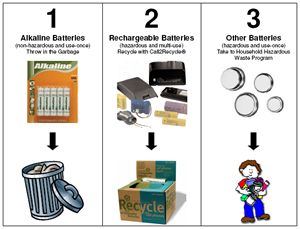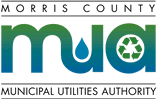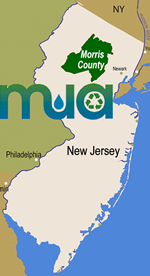Transfer Station Info (Tip Fee $111.25/ton)
- Mt. Olive Mon-Fri 7:30am-3pm; Sat 7:30am-11am
- Parsippany Mon-Fri 7am-3pm; Sat 7:30am-11am
- Closed Sundays and Major Holidays
- No Rental Trucks
- Payment by Account, Check, Credit Card. No Cash

Morris County
Municipal Utilties Authority
Transfer Station Info (Tip Fee $111.25/ton)
- Mt. Olive Mon-Fri 7:30am-3pm; Sat 7:30am-11am
- Parsippany Mon-Fri 7am-3pm; Sat 7:30am-11am
- Closed Sundays and Major Holidays
- No Rental Trucks
- Payment by Account, Check, Credit Card. No Cash
Solid Waste Material Data Sheet

Category: Hazardous
Activity Type: Recycling
-
Management Issues:
 Figuring out how to manage batteries can be as easy as 1-2-3. One (1), throw alkaline (non-hazardous and use-once) dry-cell batteries into the trash; two (2), recycle rechargeable batteries using call2recycle.orgdrop-off boxes; and three (3), take all other types of batteries to a household hazardous waste disposal program where they will be properly managed as hazardous waste.
Figuring out how to manage batteries can be as easy as 1-2-3. One (1), throw alkaline (non-hazardous and use-once) dry-cell batteries into the trash; two (2), recycle rechargeable batteries using call2recycle.orgdrop-off boxes; and three (3), take all other types of batteries to a household hazardous waste disposal program where they will be properly managed as hazardous waste.
Click here to view this information as a 2-page, downloadable and printable PDF.
-
Handling Tips: The Rechargeable Battery Recycling Corporation (RBRC) operates Call2Recycle, a free rechargeable battery recycling program.
Call2Recycle sets up retailers and public agencies as rechargeable battery drop-off locations at no cost to the participant. Currently, Home Depot, Radio Shack, Lowe's and Verizon Wireless all participate in the Call2Recycle program at all their retail
locations. These locations are provided with a drop-off box with small plastic bags so the batteries can be individually bagged in accordance with the new DOT regulations. The RBRC pays all the costs associated with providing drop-off boxes, including transportation and recycling.
Call 1-877-2-RECYCLE or use their website at http://www.call2recycle.org to find the closest public drop-off point. Additionally, Call2Recycle will provide free-of-charge drop-off boxes to any non-residential entity for the collection and recycling of their own rechargeable batteries. All one has to do is sign up online at http://www.call2recycle.org. Retailers and community recycling centers open to the public will be listed on the Call2Recycle zip code locator and toll-free help-lines to encourage residents to recycle. Additionally, public agencies and businesses can still participate in the Call2Recycle program without being advertised as a public drop-off location if they do not want to listed as such. Since everything is free of charge, the MCMUA is encouraging every business and/or public agency to request a drop-off box for its office or work site.
-
Regulations: Mandated to be source separated and recycled are hazardous dry-cell batteries only(#2, #3 and older #1s). These include rechargeable batteries (#2), such as nickel-cadmium, nickel-iron, nickel metal hydride, lithium ion, small sealed lead acid, etc. These are often used as substitutes for non-rechargeable batteries (#1) in standard sizes such as AAA, AA, C, D and 9V. Rechargeable batteries (#2) are commonly found in cordless tools, cellular and cordless phones, laptop computers, cameras, remote controls, toys, etc. Also included in this definition are non-rechargeable batteries (#3) that are hazardous as defined by the Resource Conservation Recovery Act ("RCRA"), regardless of the RCRA exclusion of household waste from the definition of hazardous waste pursuant to 40 C.F.R. 261.4(b).
Non-rechargeable, hazardous batteries include older (pre-circa 1994) alkaline and carbon zinc batteries (#1) as well as silver oxide, mercury and magnesium button-type batteries, etc. (#3)
It should be noted that domestically manufactured alkaline and carbon zinc non-rechargeable batteries (#1) made after circa 1994 eliminated mercury content to the point that they should not be considered RCRA hazardous and therefore are not included in this material category as being mandated to be source separated and recycled. These non-hazardous batteries (#1) should be disposed of in the ordinary garbage.
At the beginning of 2010, new U.S. Department of Transportation (DOT) regulations regarding the management of dry-cell batteries throughout the United States will go in effect. Because dry-cell batteries can short circuit and potentially catch fire while being transported, the DOT will require enclosing each hazardous dry-cell battery in a plastic bag to cover its terminals prior to transport.
- Mandated Recycling: If generated in Morris County, this material is required to be separated at the source by the waste generator and ultimately recycled. The material may not be mixed with garbage and additionally, materials mandated to be source separated and recycled cannot be separated from disposables by anyone or any facility but the generator at the site where the recyclables and disposables are generated. A materials recovery facility may not perform separation of recyclables from disposables on behalf of the waste generator.
- Special Handling: This material requires special handling other than traditional disposal and recycling facilities.
- Click for additional on-site information regarding Batteries (Dry Cell)
Facilities That Manage Batteries (Dry Cell)

Plane Street DPW Garage
Boonton, NJ 07005
Tel: 973-402-9460 Fax: (973) 263-4725
Email: dpw@boonton.org
WWW: www.boonton.org

155 Powerville Road (Behind Municipal Building)
Boonton Twp., NJ 07005
Tel: (973) 402-4024 Fax: (973) 402-4025
WWW: www.boontontownship.com

One Ace Road
Butler, NJ 07405
Tel: 973-838-7200
WWW: www.butlerborough.com

250 West Main Street
Chester, NJ 07930
Tel: 908-879-7612 Fax: 908-879-8695
Email: lesley.karczewski@chesterlib.org
WWW: www.chesterlib.org

1 Parker Road
Chester, NJ 07930
Tel: (908) 879-5361 Fax: (973) 879-5812
WWW: www.chestertownship.org

220 Franklin Road, Unit H
Randolph, NJ 07869
Tel: (877) 257-7658 Fax: (877) 257-7658
Email: recycle@clrsolutionsnj.com
WWW: www.clrsolutionsnj.com

140 Morris Avenue
Denville, NJ 07834
Tel: 973-625-8334
WWW: www.denvillenj.org

20 Watchung Ave
Chatham, NJ 07928
Tel: 973 635 5151

8 Melanie Lane
East Hanover, NJ 07936
Tel: 973-888-6080 Fax: 973-889-3981
WWW: www.easthanovertownship.com

Public Works Garage Yard
Millbrook Road
New Vernon, NJ 07976
Tel: 973-267-2448 Fax: 973-292-9539
Email: ttoribio@hardingnj.org
WWW: www.hardingnj.org

530 Mt. Pleasant Ave.
Dover, NJ 07801
Tel: 973-442-0101
WWW: www.homedepot.com

902 Murray Road
East Hanover, NJ 07936
Tel: 973-887-4444
WWW: www.homedepot.com

79 Route 46
Montville, NJ 07045
Tel: 973-575-0823
WWW: www.homedepot.com

780 Route 46 West
Parsippany, NJ 07054
Tel: 973-335-5917
WWW: www.homedepot.com

106 Route 23 North
Riverdale, NJ 07457
Tel: 973-248-0585
WWW: www.homedepot.com

281 Route 10, Ste 04
Succasunna, NJ 07876
Tel: 973-927-7700
WWW: www.homedepot.com

4 Sparta Mountain Road
Oak Ridge, NJ 07438
Tel: (973) 697-1500
WWW: www.jeffersontownship.net

118 Kinnelon Road
Kinnelon, NJ 07405
Tel: 973-838-5401 x233 Fax: 973-838-1862
WWW: www.kinnelonboro.org/

370 Main Street (George Cobb Lane)
Lincoln Park, NJ 07035
Tel: 973-694-6100 x2058
Email: vsiese@bolp.org or jlapoint@bolp.org
WWW: www.lincolnpark.org

1210 Route 23 North
Butler, NJ 07405
Tel: 973-291-5000
WWW: www.Lowes.com

20 International Drive South
Flanders, NJ 07836
Tel: 973-426-0634
WWW: www.Lowes.com

Mount Olive Transfer Station
168 Gold Mine Road
Mount Olive, NJ 07836
Tel: (973) 829-8006 Fax: (973) 285-8397
WWW: mcmua.com/sw_hhw_pfac.asp

263 Tabor Road (Route 53)
Morris Plains, NJ 07950
Tel: (973) 538-2224 Fax: (973) 538-8834
WWW: www.morrisplainsboro.org

Jane Way
(Located off of West Hanover Ave.)
Morris Township, NJ 07960
Tel: (973) 326-7398 Fax: (973) 326-9580
Email: teschmann@morristwp.com
WWW: www.morristwp.com

55 Pocono Road - Behind the DPW Building
Mountain Lakes, NJ 07046
Tel: (973) 334-1577 Fax: (973) 334-1494
WWW: www.mtnlakes.org

Flanders Road
Netcong, NJ 07857
Tel: (973) 426-7854 Fax: (973) 347-3020
WWW: www.netcong.org

Pump House Road
(Located off Rt. 46 eastbound)
Parsippany, NJ 07054
Tel: (973) 263-7273 Fax: (973) 263-7373
WWW: www.parsippany.net

1345 Sussex Turnpike
Randolph, NJ 07069
Tel: 973.989.7050
WWW: www.randolphnj.org

21-25 Union Street - DPW Garage
Rockaway, NJ 07866
Tel: (973) 627-2000 Fax: (973) 627-8294
WWW: www.rockawayborough.com

96 N. Dell Avenue
Kenvil, NJ 07847
Tel: (973) 448-2053 Fax: (973) 927-2876
Email: keyesk@roxburynj.us
WWW: www.roxburynj.us
Pounds Per Unit Conversions
- Each Pound weighs 1 pounds.
- Each Ton weighs 2000 pounds.

